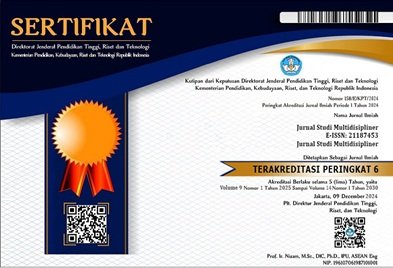PENGARUH PENERAPAN PROJECT BASED LEARNING (PJBL) BERBASIS JEJAHITAN BALI TERHADAP PRESTASI BELAJAR MATEMATIKA TOPIK BANGUN DATAR DIKELAS 3 SD NEGERI 2 BATUBULAN
Kata Kunci:
Project Based Learning, Jejahitan Bali, Bangun DatarAbstrak
Penelitian ini bertujuan untuk mengetahui pengaruh penerapan Project Based Learning (PjBL) berbasis jejahitan Bali terhadap prestasi belajar matematika siswa kelas III SD pada topik bangun datar. Penerapan pendekatan ini didasarkan pada kebutuhan untuk menciptakan pembelajaran yang bermakna dan kontekstual dengan mengintegrasikan unsur budaya lokal ke dalam proses belajar. Metode penelitian yang digunakan adalah eksperimen semu dengan desain nonequivalent control group design. Sampel terdiri dari dua kelas, yaitu kelas eksperimen yang mendapatkan pembelajaran menggunakan model PjBL berbasis jejahitan Bali, dan kelas kontrol yang menggunakan metode konvensional. Teknik pengumpulan data dilakukan melalui tes hasil belajar. Hasil uji hipotesis menggunakan independent sample t-test menunjukkan bahwa terdapat perbedaan yang signifikan antara nilai rata-rata post-test kelas eksperimen dan kelas kontrol, dengan nilai Thitung sebesar 12,697 lebih besar dari Ttabel sebesar 1,992. Kelas eksperimen memperoleh rata-rata nilai sebesar 82,05, sedangkan kelas kontrol hanya mencapai 67,56. Perbedaan nilai ini menunjukkan bahwa keterlibatan siswa dalam proyek berbasis jejahitan Bali membantu menguatkan pemahaman konsep bangun datar secara konkret dan kontekstual. Aktivitas menjahit pola geometris memungkinkan siswa menghubungkan konsep matematika dengan pengalaman nyata, serta meningkatkan keterampilan berpikir kritis dan kreatif. Temuan ini mendukung teori konstruktivisme yang menekankan pentingnya pengalaman langsung dalam pembentukan pengetahuan. Integrasi budaya lokal dalam pembelajaran juga terbukti mampu meningkatkan motivasi dan hasil belajar siswa.
This study aimed to determine the effect of implementing Project Based Learning (PjBL) based on Balinese stitching on the mathematics learning achievement of third-grade elementary school students in the topic of plane shapes. The implementation of this approach was based on the need to create meaningful and contextual learning by integrating local cultural elements into the learning process. The research method used was a quasi-experiment with a nonequivalent control group design. The sample consisted of two classes: an experimental class that received learning through the PjBL model based on Balinese stitching and a control class that received conventional instruction. Data collection techniques were carried out through learning achievement tests. The hypothesis test using an independent sample t-test showed a significant difference between the post-test average scores of the experimental and control classes, with a t-value of 12.697 greater than the t-table value of 1.992. The experimental class achieved an average score of 82.05, while the control class only reached 67.56. This difference indicated that student involvement in projects based on Balinese stitching helped strengthen the understanding of plane shape concepts in a concrete and contextual manner. The activity of stitching geometric patterns allowed students to connect mathematical concepts with real-life experiences and enhanced their critical and creative thinking skills. These findings supported constructivist theory, which emphasized the importance of direct experience in knowledge construction. The integration of local culture into learning also proved to improve student motivation and academic performance.





